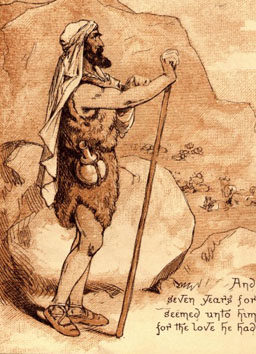| Jacob  Born: ? Born: ?
Birthplace: Lahai-roi
Died: ?
Location of death: Goshen
Cause of death: unspecified
Remains: Buried, Canaan
Gender: Male
Religion: Jewish
Race or Ethnicity: Middle Eastern
Sexual orientation: Straight
Occupation: Religion Nationality: Ancient Israel
Executive summary: Father of the twelve tribes Jacob (Hebrew ya'aqov, derived, according to Genesis 25:26 and 27:36, from a root meaning "to seize the heel" or "supplant"), son of Isaac and Rebekah in the Biblical narrative, and the father of the twelve tribes of Israel. Jacob and his twin brother Esau are the eponyms of the Israelites and Edomites. It was said of them that they would be two nations, and that the elder would serve the younger.
Esau was born first, but lost his superiority by relinquishing his birthright, and Jacob by an act of deceit gained the paternal blessing intended for Esau (Genesis 27, J and E). The popular view regarding Israel and Edom is expressed when the story makes Jacob a tent-dweller, and Esau a hunter, a man of the field. But while Esau married among the Canaanite daughters of the land (P in 27:34; 28:8 seq.), Jacob was sent, or (according to a variant tradition) fled from Beersheba, to take a wife from among his Syrian kinsfolk at Haran. On the way he received a revelation at Bethel ("house of God") promising to him and to his descendants the whole extent of the land. The beautiful story of Jacob's fortunes at Haran is among the best examples of Hebrew narrative: how he served seven years for Rachel, "and they seemed a few days for the love he had to her", and was tricked by receiving the elder sister Leah, and how he served yet another seven years, and at last won his love.
The patriarch's increasing wealth caused him to incur the jealousy of his father-in-law, Laban, and he was forced to flee in secret with his family. They were overtaken at Gilead, whose name (interpreted "heap of witness") is explained by the covenant into which Jacob and Laban entered (31:47 sqq.). Passing Mahanaim ("camps"), where he saw the camps of God, Jacob sent to Esau with friendly overtures. At the Jabbok he wrestled with a divine being and prevailed (cf. Hos. 12:3 sqq.), hence he called the place Peniel or Penuel ("the face of God"), and received the new name Israel. He then effected an unexpected reconciliation with Esau, passed to Succoth, where he built "booths" for his cattle (hence its name), and reached Shechem. Here he purchased ground from the clan Hamor (cf. Judges 9:28), and erected an altar to "God (El) the God of Israel." This was the scene of the rape of Dinah and of the attack of Simeon and Levi which led to their ruin (Genesis 34). Thence Jacob went down south to Bethel, where he received a divine revelation (P), similar to that recorded by the earlier narrator (J), and was called Israel (35:9-13 and 15). Here Deborah, Rebekah's nurse, died on the way to Ephrath. Rachel died in giving birth to Benjamin, and further south Reuben was guilty of a grave offense (cf. 49:4). According to P, Jacob came to Hebron, and it was at this juncture that Jacob and Esau separated (a second time) and the latter removed to Mount Seir (36:6 sqq.; cf. the parallel in 13:5 sqq.).
Compelled by circumstances, described with much fullness and vividness, Jacob ultimately migrated to Egypt, receiving on the way the promise that God would make of him a great nation, which should come again out of Egypt. After an interview with the Pharaoh (recorded only by F, 47:5-11), he dwelt with his sons in the land of Goshen, and as his death drew near pronounced a formal benediction upon the two sons of Joseph (Manasseh and Ephraim), intentionally exalting the younger. Then he summoned all the "sons" to gather round his bed, and told them "what shall befall in the latter days" (Genesis 49). He died at the age of 147 (so P), and permission was given to carry his body to Canaan to be buried.
These narratives are full of much valuable evidence regarding marriage customs, pastoral life and duties, popular beliefs and traditions, and are evidently typical of what was currently retailed. Their historical value has been variously estimated. The name existed long before the traditional date of Jacob, and the Egyptian phonetic equivalent of Jacob-el (cf. Isra-el, Ishma-el) appears to be the name of a district of central Palestine (or possibly east of Jordan) about 1500 BC. But the stories in their present form are very much later. The close relation between Jacob and Aramaeans confirms the view that some of the tribes of Israel were partly of Aramaean origin; his entrance into Palestine from beyond the Jordan is parallel to Joshua's invasion at the head of the Israelites; and his previous journey from the south finds independent support in traditions of another distinct movement from this quarter. Consequently, it would appear that these extremely elevated and richly developed narratives of Jacob-Israel embody, among a number of other features, a recollection of two distinct traditions of migration which became fused among the Israelites. Father: Isaac
Mother: Rebekah
Brother: Esau (his twin brother)
Wife: Leah (wife #1)
Son: Reuben
Son: Simeon
Son: Levi
Son: Judah
Son: Issachar
Son: Zebulum
Daughter: Dinah
Wife: Bilhah (wife #2)
Son: Dan
Son: Naphtali
Wife: Zilpah (wife #3)
Son: Gad
Son: Asher
Wife: Rachel (wife #4, d. childbrith)
Son: Joseph
Son: Benjamin
Biblical Figures
Requires Flash 7+ and Javascript.
Do you know something we don't?
Submit a correction or make a comment about this profile
Copyright ©2019 Soylent Communications
|